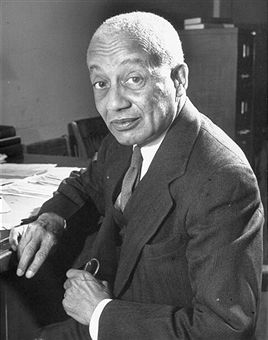
Alain LeRoy Locke
Alain Locke was born on September 13, 1885 (to June 9, 1954). He was an important gay, Black writer, philosopher, scholar, and patron of the arts, who is often referred to as the “Father of the Harlem Renaissance.” Locke was the first person of African descent to be named as a Rhodes Scholar.
Alain LeRoy Locke was the only child of Pliny Locke and Mary Hawkins. Although his parents were both from “old-line Philadelphia families,” they remained engaged for 16 years, and did not marry until they were middle-aged.
Alain Locke was nurtured in an urbane, cultivated home environment. Following the death of his father, his mother supported her son through teaching. Alain contracted rheumatic fever early in his childhood, permanently damaging his heart and restricting his physical activities. In their place, he spent his time reading books, and learning to play the piano and violin.
Locke graduated Phi Beta Kappa from Harvard University in 1907, with degrees in both English and Philosophy, and went on to continue his studies at Hertford College, the University of Berlin, and the Collège de France in Paris. He attended Oxford University as the first African American Rhodes Scholar in history. But owing to racism, he was only eligible to be hired by historically Black colleges upon his return to the United States, despite this esteemed honor. He received an assistant professorship in English at Howard University, in Washington, DC, and would later return to Howard as the chair of the Department of Philosophy, a position he held until his retirement in 1953.
Alain Locke edited the landmark 1925 anthology, “The New Negro.” A wide-ranging collection of poetry, essays, fiction, and art, “The New Negro” gathered together many of the most important figures in what would be the Harlem Renaissance. It also displayed Locke’s ideas about how African American culture was to proceed. Locke agreed in essence with African American intellectual W.E.B. DuBois’s theory of “the Talented Tenth”: that the progress and achievements of the most educated and skillful blacks would help the entire race achieve equality. But Locke disagreed with DuBois’s belief that all art must have a directly political or moral purpose. His view was that artistic expression would cause a cultural awakening among African Americans, and this awakening would help to improve self-image and a sense of community.
Locke’s philosophy served as a strong motivating force in keeping the energy and passion of the artistic and cultural resurgence of the Harlem Renaissance at the forefront of America’s literary and academic principals. He also frequently acted as a gatekeeper for philanthropists looking to support Black talent.
In addition to providing a forum for up-and-coming writers through his editing activities, Locke was closely connected with one of the main white patrons of the Harlem Renaissance, Charlotte Osgood Mason. Locke served as “talent scout” for Mason, seeking out artists worthy of her patronage. At various times, Mason provided money to writers who were recommended by Locke, such as Langston Hughes and Zora Neale Hurston.
Despite, or perhaps because of his power to help make artistic careers, Locke was not universally beloved. His head could also be turned by a handsome man, which may sometimes have influenced his decisions in whose career to aid. He pursued Langston Hughes before apparently giving up in frustration in the face of Hughes’ often ambiguous sexual interests. Locke also had a complicated relationship with Richard Bruce Nugent, the one openly gay member of the Harlem Renaissance.
Locke promoted African American artists, writers, and musicians, encouraging them to look to Africa as an inspiration for their works. He was also deeply committed to the intellectual life of America’s Black community. Shortly after Locke’s death in 1954, an article in “The Washington Post” discussed the eulogy delivered at Howard University, and Professor Robert E. Martin’s statement that Locke was “motivated by two fundamental influences—great devotion to the intellectual life and deep concern for students.”
Alain Locke was one of the founders of the Phi Beta Kappa Society, and was a prominent member of the Bahá’í Faith.
Following his death, Locke was cremated and his ashes given to his close friend and executor, Philadelphia activist and educator Arthur Huff Fauset. The remains were supposed to be given to Howard University, but languished for decades at Philadelphia’s St Thomas Church. In the 1990s, a brown paper bag containing his created remains finally found its way to the Moorland-Spingarn archives at Howard.
The cremated ashes were repackaged in a simple urn in 2012, and several Black Rhodes Scholars offered funds to find a suitable resting place for Locke’s remains. They were finally interred at the historic Congressional Cemetery in Washington, DC.
Locke’s name and legacy live on at institutions such as the Alain L. Locke Magnet School for Environmental Stewardship in South Harlem, the Alain Leroy Locke College Preparatory Academy in Los Angeles, Alain Locke Elementary School in Philadelphia, and Alain Locke Charter School in Chicago.
We remember Alain LeRoy Locke in appreciation of his extraordinary achievements in philosophy, his commitment to teaching and public service, and for his many contributions to the Harlem Renaissance and our community.


